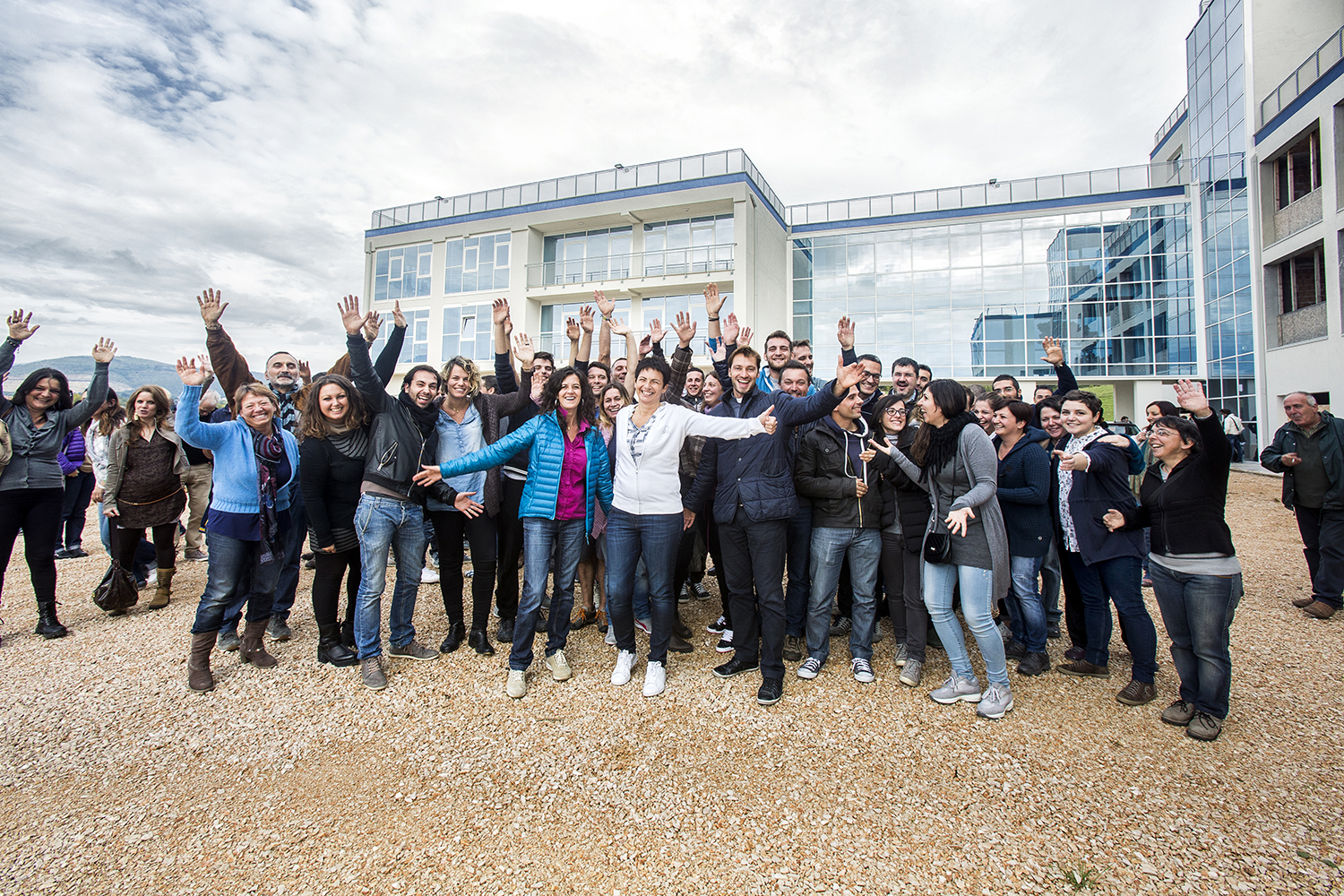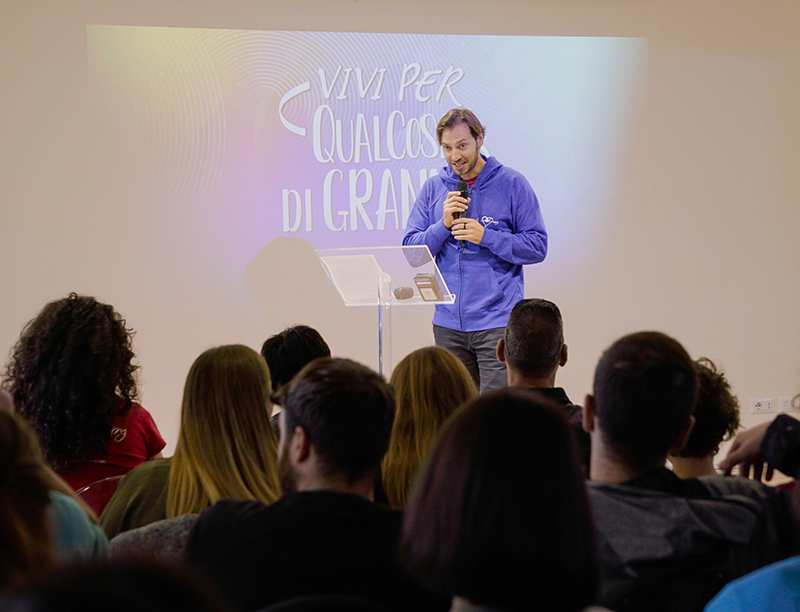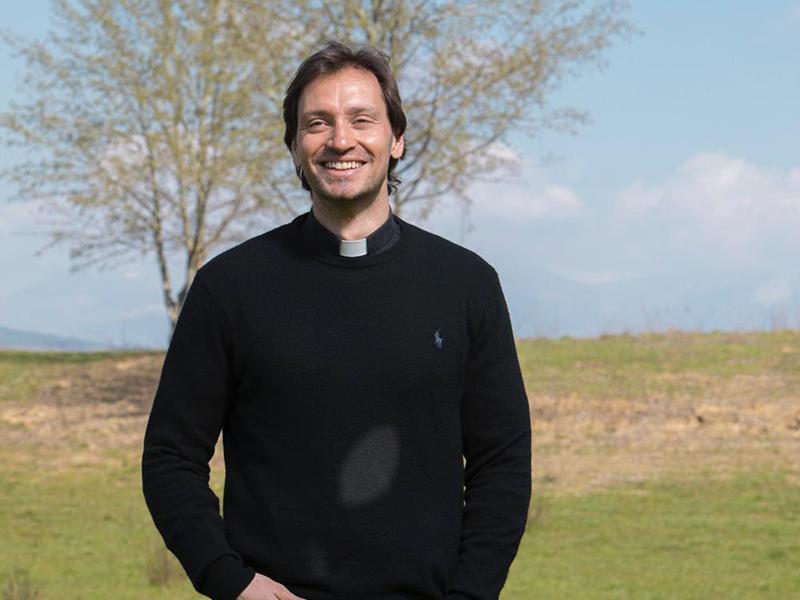faith

Interview with the priest
Don Davide Banzato go back to Assisi with the program The Journeys of the Heart. The Paduan priest confides in us how his life has changed in meeting the most fragile people.
Smiling and with simplicity, Don Davide Banzato spoke on various occasions about his vocational journey, leaving the seminary, the cry of rebellion “everything but a priest never” (which is the title of one of his books), then the meeting with Chiara Amirante and the community New Horizons which marks a turning point.
Davide, apparently you weren’t the quiet type as a boy?
Since I was a child, I asked questions on any subject. I was attracted to understanding the meaning of life and spirituality. I’ve always wondered what my place is in the world. I was thinking about this: life is one and I wouldn’t want to look back at some point and have wasted it. This sense of research and curiosity has remained. I am fascinated by new things, by what I don’t know, by encounters with each person, especially with those who are apparently fragile and who are rejected by society. Instead, for me they have become the real university to learn from.
In your book “Tutto ma prete mai” you talk about the difficult years in the seminary. What’s happened?
I lived in a family that gave me excellent principles and values. It is one of my greatest fortunes. In the parish I participated in the ACR and scouting. Mine was a peaceful childhood. That desire to understand what I wanted to do with my life was intercepted by the minor seminary of Padua. Like all realities, the difference is made by people, not by structures. In the seminary there were good things and others that didn’t work because they weren’t up to date. The rules were very strict and religiosity was enforced, without paying attention to the young age of the seminarians. At a certain point, also due to my somewhat rebellious character, a rift arose between me and myself, between me and the world, between me and God. After two and a half years I came to say: God, give from now on i do what i want and i decide what is good and bad in my life. If I feel bad, I readmit the idea that you exist, but if I feel good it means that I don’t need you. And anyway I will do everything in my life, except the priest. I was done with the Church institution. Back home I took a risk, like so many kids who ended up in dangerous crossroads. Some of my friends have fallen into drug use, some into alcohol. I, too, was on a razor’s edge.
Who changed you?
The person God used to change my life was Chiara Amirante. It is interesting how one encounters God: in so many ways and everyone has his way. The experiences of mystics have the category of dreams (as for Don Bosco), then there are private revelations (as for Saint Teresa of the Child Jesus), while in the ordinary way God speaks to the intellect, heart and soul of individuals , and very often in meeting someone.
Thanks to Chiara I realized that for my pride I criticized everyone, even God and the Church. I didn’t realize that in the end I was unhappy not because of the others, but because I was the one who had to make different choices. It’s the big mistake we make in our lives: we blame others, and this takes away responsibility. Chiara led me to a huge sense of responsibility, asking me questions about who I am, what I want, where I’m going. 
What struck you about Chiara?
Seeing the light and the joy in her eyes made me ask the question: “what is different about me from her?”. She is a person like any other, where is her secret about her? When she told me the secret is to try to live the gospel, I didn’t believe it. But she replied: “Up to now you have heard the Gospel, sometimes heard it, but trying to live it is another thing. It is not a book like the others, it changes your life to the extent that you try to live it”. So I did that exercise she recommended. I wrote on the palm of my hand a phrase from the Gospel I heard that day so that at every recreation bell I would remember to try to live it. Then in the evening I did an examination of conscience. Suddenly something changed. Day after day a fullness was born in me, a joy that no longer depended on external factors, but was something stable, a joy fruit of the Spirit within me. This was the real turning point for me.
You are now a priest. How do you evaluate all these experiences?
The answer is in a phrase of Saint Paul: “Everything contributes to the good of those who love God”. Every day I meet and listen to people who have had much more dramatic lives than mine. If one seeks God sincerely, at a certain point He is capable of using any wound to make it a loophole of love and light. Thanks to my experience I am able to be more empathetic, to understand those who have experienced the same feelings as me, talking to them opens a breach in the heart. I have no claim to teach anyone anything, mine is a sharing of experiences.
You meet many people: what do they need?
The great need I see is for sense and listening. Today there is growing loneliness and bewilderment because of the lack of goals. We are so disillusioned with life, especially among the very young, that we no longer ask ourselves questions, we suffer life instead of living it. 
How can suffering help people rediscover themselves and God?
Suffering is inevitable. Even evil is evidence: St. Augustine said that no life is free from trials, but trials presuppose temptation and that also gives us the opportunity to be who we want to be. In the face of evil we ask ourselves how God, who is good and loving, allows it both when it is the fruit of our wrong choices and of a child who suffers it. These are important and current topics like never before between the pandemic, the economic crisis, with 59 wars and 800 conflicts in the world. Evil is also the fruit of sinful structures, the evil choices of the majority.
There are natural cataclysms, whose origin can be found in part in our choices, but sometimes they are beyond our control. To this theme Chiara proposes a path called SpiriTherapy in order not to be crushed by pain or disappointment, in which to look to Jesus as an answer to evil. St. Paul says “conquer evil with good”, in other words you are oriented towards good choices. Chiara in her latest book tells of physical pain, illnesses, difficult moments in community life that have sometimes led her to have doubts, to think of giving up. Like all. Making sense of suffering is essential. A sentence of hers in this regard is illuminating: “There is no prayer more powerful than the pain offered out of love”. I have repeated this phrase to sick people who cannot do anything, such as a completely paralyzed friend of mine. It was a turning point for him. Suffering can mystically enter into a divine alchemy, that pain offered out of love produces something. If, on the other hand, it becomes a withdrawal into oneself, it produces nothing, if only pain.
You return to Assisi with the “Travels of the Heart” programme. What do you show this time?
Through this transmission, born in 2016, we try to communicate art, beauty, history and culture. These are aspects that can evangelize and, in any case, bring something beautiful to people’s hearts. From this point of view, Assisi has a unique heritage to offer. Francesco’s places are places that speak to anyone, of any age, culture or religion, even to non-believers, because beyond the artistic, landscape and cultural beauty, they transmit peace and allow the compass of the heart of today’s man to stop and return within oneself to reorient oneself.
Thanks to the collaboration of the friars of the Sacred Convent we will have access to environments such as the chapel of Friar Elia, and in the Library we will be able to see the Canticle of Friar Sole, the first literary text in the vernacular. Francesco’s life is very current. He too struggled with the “bad demons” we all struggle with. We are looking for “the demon of happiness”, which the Greeks call “eudaimonia,” a talent to develop, but we struggle within ourselves with the demons that lead us astray such as vanity, power, craving for success and instead the positive ones are love and self-giving. Even Francesco didn’t magically change his life, he followed a path that today, eight centuries later, speaks to all the men of the world. Furthermore, in this new cycle of episodes we will visit a mission in Kenya among the poorest slams in the world, touching on the theme of creation by addressing the issue of poaching. We will be in Turkey in Istanbul where we will meet a Catholic minority that carries on ecumenical and interreligious dialogue.
What is your favorite place?
I am very attached to La Verna, where I have taken refuge many times in the most important moments of my life. Then comes Assisi because I used to come with my father who is no longer here. Being Paduan there is the Saint of Padua: stopping and praying in front of the tomb of the Saint is always a source of recharge and refreshment for me. Then the Marian places Medjugorje, Lourdes and Fatima. I had the privilege of discovering the Holy Land which is a place of the heart for everyone, an extraordinary journey in the fifth Gospel. But all these places must lead me to understand that my heart place is the heart itself. For us Christians, as Jesus told us, you are the Temple of the Holy Spirit: wherever you are you can pray, open your heart to God and He will manifest Himself to you. I really like to pray in open-air cathedrals, surrounded by nature, but also in my room. Closing my eyes I find within me the place of the heart where all the other places are actualized.
How do you find yourself in the television world as a priest?
I find myself in the field of communication a bit by chance. I discovered I have a gift for communicating and put it to good use. I have had some very good professionals who have helped me grow over time. For me it is essential to do it in obedience and it must be a service otherwise it makes no sense. Surely the media have a great sounding board. I consider them a means and not an end, I must be able not to let them use me. I have to pay attention to pride, arrogance and vanity, they are always there at the crossroads. My luck is living in a community and in obedience. I made the choice to dedicate a few days to communication in a month, for the rest of the time my concrete mission is with the kids. You need the right balance.
Who is Don Davide now?
I remain that child who continues to be a bit rebellious, and must learn to be humble, and to look at life and the Gospel with simplicity, trying to live it more attentively, with as much radicality as possible, and always seeking to understand what the Lord means to me. he asks. Because we are always on the road anyway. The fathers of the desert used to say that whoever doesn’t go forward goes backwards. You can’t stand still. I like the phrase of Jesus who says: “Only one is the Master”. I feel like the others, walking. We are all disciples of him.
Don Davide Banzato was born in Padua in 1981. A priest since 2006, with a degree in moral theology, he resides in Frosinone at the Nuovi Orizzonti community, founded by Chiara Amirante, of which he has been spiritual assistant since 2010 engaged in the recovery of youth discomfort. He leads the program “The journeys of the heart” for Mediaset.
Dear friends, the magazine San Francesco and the sanfrancesco.org website have always been the megaphone of Francis’ messages, the voice of the large Franciscan family to which you belong.
Only thanks to your support and closeness will we be able to be your point of reference. A small gesture that is worth a lot to us, even just 1 euro is enough.
DONATE

